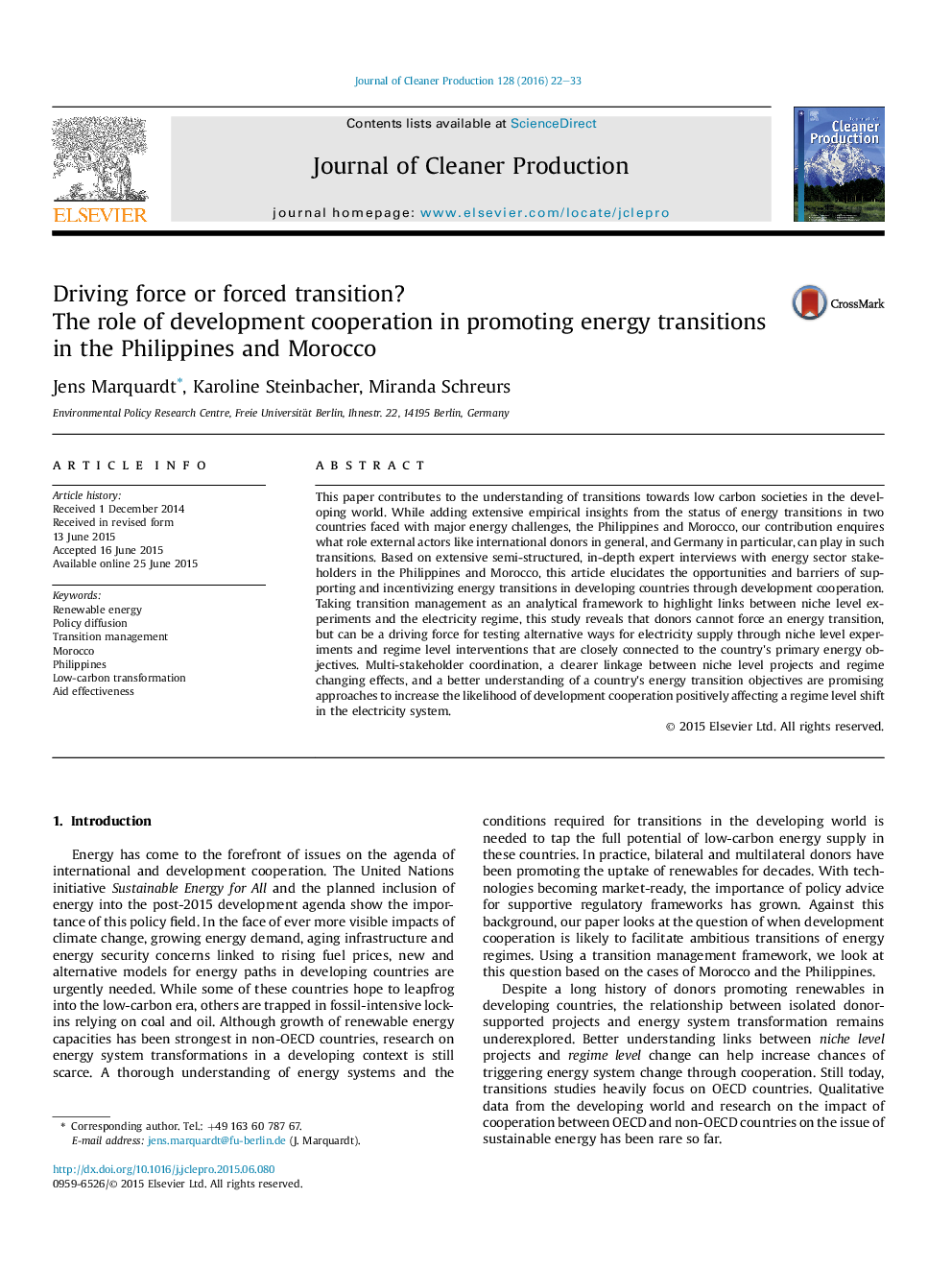| کد مقاله | کد نشریه | سال انتشار | مقاله انگلیسی | نسخه تمام متن |
|---|---|---|---|---|
| 1744128 | 1522121 | 2016 | 12 صفحه PDF | دانلود رایگان |
عنوان انگلیسی مقاله ISI
Driving force or forced transition?
ترجمه فارسی عنوان
نیروی رانندگی یا انتقال اجباری؟
دانلود مقاله + سفارش ترجمه
دانلود مقاله ISI انگلیسی
رایگان برای ایرانیان
کلمات کلیدی
انرژی تجدید پذیر، انتشار سیاست، مدیریت گذار، مراکش، فیلیپین، دگرگونی کربن، اثربخشی کمک،
ترجمه چکیده
این مقاله به درک تغییرات در ارتباط با جوامع کم کربن در کشورهای در حال توسعه کمک می کند. در حالی که با اضافه کردن بینش های تجربی گسترده از وضعیت انتقال انرژی در دو کشور با چالش های عمده انرژی، فیلیپین و مراکش، مشارکت ما در مورد نقش بازیگران خارجی مانند اهداکنندگان بین المللی به طور کلی و مخصوصا آلمان می تواند در چنین تغییراتی بازی کند. براساس مصاحبه عمیق نیمه ساخت یافته و عمیق با ذینفعان بخش انرژی در فیلیپین و مراکش، این مقاله، فرصت و موانع پشتیبانی و انگیزه گذار در انتقال انرژی را در کشورهای در حال توسعه از طریق همکاری های توسعه نشان می دهد. با توجه به مدیریت گذار به عنوان یک چارچوب تحلیلی برای برجسته کردن ارتباط بین آزمایش های سطح طاقچه و رژیم الکتریکی، این مطالعه نشان می دهد که اهدا کنندگان نمی توانند انتقال انرژی را مجبور کنند، اما می توانند نیروی محرک برای آزمایش راه های جایگزین برای تامین برق از طریق آزمایشات سطحی و سطح رژیم مداخلات که نزدیک به اهداف انرژی اولیه کشور مرتبط است. هماهنگی چندین شرکت کننده، پیوند واضحتری بین پروژه های سطح طاقچه و اثرات تغییر رژیم و درک بهتر اهداف انتقال انرژی در کشور، رویکردهای امیدوار کننده برای افزایش احتمال همکاری توسعه است که به طور مثبت در تغییر رژیم در سیستم برق تاثیر می گذارد.
موضوعات مرتبط
مهندسی و علوم پایه
مهندسی انرژی
انرژی های تجدید پذیر، توسعه پایدار و محیط زیست
چکیده انگلیسی
This paper contributes to the understanding of transitions towards low carbon societies in the developing world. While adding extensive empirical insights from the status of energy transitions in two countries faced with major energy challenges, the Philippines and Morocco, our contribution enquires what role external actors like international donors in general, and Germany in particular, can play in such transitions. Based on extensive semi-structured, in-depth expert interviews with energy sector stakeholders in the Philippines and Morocco, this article elucidates the opportunities and barriers of supporting and incentivizing energy transitions in developing countries through development cooperation. Taking transition management as an analytical framework to highlight links between niche level experiments and the electricity regime, this study reveals that donors cannot force an energy transition, but can be a driving force for testing alternative ways for electricity supply through niche level experiments and regime level interventions that are closely connected to the country's primary energy objectives. Multi-stakeholder coordination, a clearer linkage between niche level projects and regime changing effects, and a better understanding of a country's energy transition objectives are promising approaches to increase the likelihood of development cooperation positively affecting a regime level shift in the electricity system.
ناشر
Database: Elsevier - ScienceDirect (ساینس دایرکت)
Journal: Journal of Cleaner Production - Volume 128, 1 August 2016, Pages 22-33
Journal: Journal of Cleaner Production - Volume 128, 1 August 2016, Pages 22-33
نویسندگان
Jens Marquardt, Karoline Steinbacher, Miranda Schreurs,
